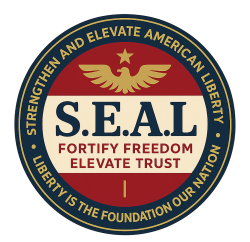S.E.A.L. Our Heritage: Cattle, Farms, Water, and Liberty
Seal in and Enhance American Liberty—Stand Fast, Stand Strong
The Bedrock of Freedom
In a world obsessed with tech and sprawl, the real pillars of our liberty—cattle, local farms, and clean water—get sidelined. These aren’t just resources; they’re our heritage, our health, and our fight for a free future. We don’t bend to industrial overlords or foreign handouts. We stand fast, sealing in what’s ours.
Cattle aren’t livestock—they’re grit incarnate. For millennia, they’ve fed us, clothed us, and fueled our way forward. Grazing keeps grasslands alive, cuts wildfire risks, and feeds the soil without chemical crutches. They’re not a burden; they’re a balance. And the ranchers tending them? They’re the backbone of local economies, keeping communities tight and independent—not pawns of some corporate machine.
Local farms are liberty in action. Forget factory fields churning out monoculture slop. Family farms steward the land, respect the herd, and grow food that doesn’t need a passport. They’re our shield against food insecurity and carbon-bloated supply chains. Every dollar spent there is a vote for diversity, resilience, and a landscape that still looks like home.
Clean water ties it all together—cattle drink it, crops need it, we live by it. It’s non-negotiable. Without it, farms wither, herds falter, and our kids inherit a wasteland. Pollute it, drain it, or sell it off, and you’re gutting our sovereignty. This isn’t just about survival—it’s about keeping what’s ours, free and clear.
The Threats to Liberty
But the vultures circle. Industrial ag—with its soil-killing sprawl and water-choking runoff—treats land like a factory floor. Deforestation for cheap beef overseas slashes habitats and pumps carbon into the air, all while imported meat floods in, undercutting our ranchers. It’s not just an environmental hit; it’s an economic gut punch to the people who feed us. Lower standards abroad mean more damage there and less control here. That’s not freedom—that’s dependency dressed up as progress.
Sealing It In
We don’t need lectures from bureaucrats or handouts from globalists. Liberty demands we act. Buy local beef—sourced from ranchers who know the land, not faceless feedlots half a world away. Push for policies that reward regenerative farming, not punish it—subsidies for stewardship, not sprawl; trade rules that don’t screw our own. Protect our watersheds like the lifelines they are—no compromises.
This isn’t nostalgia; it’s strategy. Cattle grazing right keeps ecosystems humming. Local farms thriving keep us fed and free. Clean water flowing keeps the whole damn thing alive. S.E.A.L. it in—stand strong against the suits and systems that’d trade our heritage for a quick buck.
The Line in the Dirt
Imported beef’s a Trojan horse—cheap today, costly tomorrow. It erodes our ranches, fouls our planet, and leaves us begging at someone else’s table. Same goes for industrial ag’s shortcuts. We’re not here to be tenants in our own land. Support the local, ditch the foreign, and demand the feds back off with their one-size-fits-all nonsense.
Preserving cattle, farms, and water isn’t some green fantasy—it’s liberty’s heartbeat. It’s jobs for our neighbors, food on our plates, and a legacy that doesn’t buckle. Together, we S.E.A.L. it tight: self-reliant, unyielding, and free. That’s the American way. That’s our way.
